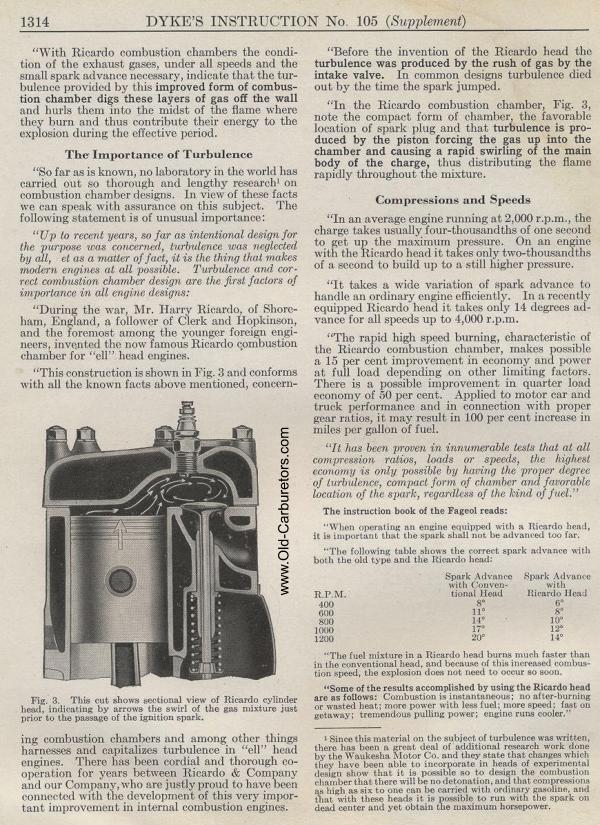Ricardo Cylinder Heads
"With Ricardo combustion chambers the condition of the exhaust
gases, under all speeds and the small spark advance necessary,
indicate that the turbulence provided by this improved form of
combustion chamber digs these layers of gas off the wall and
hurls them into the midst of the flame where they burn and thus contribute
their energy to the explosion during the effective period.
The Importance of Turbulence
"So far as is known, no laboratory in the world has carried
out so thorough and lengthy research' on combustion chamber designs.
In view of these facts we can speak with assurance on this subject.
The following statement is of unusual importance:
"Up to recent years, so far as intentional design for the purpose
was concerned, turbulence was neglected by all, et as a matter of
fact, it is the thing that makes modern engines at all possible.
Turbulence (Intl correct combustion chamber design are the first
factors of iniportunce in all engine designs:
"During the war, Mr. Harry Ricardo, of Shore-ham, England, a
follower of Clerk and Hopkinson, and the foremost among the younger
foreign engineers, invented the now famous Ricardo combustion chamber
for "ell" head engines.
"This construction is shown in Fig. 3 and conforms with all
the known facts above mentioned, concern-
Fig. 3. This cut shows sectional view of Ricardo cylinder head,
indicating by arrows the swirl of the gas mixture just prior to
the passage of the ignition spark.
ing combustion chambers and among other things harnesses and capitalizes
turbulence in "ell" head engines. There has been cordial
and thorough co-operation for years between Ricardo & Company
and our Company, who are justly proud to have been connected with
the development of this very important improvement in internal
combustion engines.
"Before the invention of the Ricardo head the turbulence was
produced by the rush of gas by the intake valve. In common designs
turbulence died out by the time the spark jumped.
"In the Ricardo combustion chamber, Fig. 3, note the compact
form of chamber, the favorable location of spark plug and that turbulence
is produced by the piston forcing the gas up into the chamber and
causing a rapid swirling of the main body of the charge, thus distributing
the flame rapidly throughout the mixture.
Compressions and Speeds
"In an average engine running at 2,000 r.p.m., the charge takes
usually four-thousandths of one second to get up the maximum pressure.
On an engine with the Ricardo head it takes only two-thousandths
of a second to build up to a still higher pressure.
"It takes a wide variation of spark advance to handle an ordinary
engine efficiently. In a recently equipped Ricardo head it takes
only 14 degrees advance for all speeds up to 4,000 r.p.m.
"The rapid high speed burning, characteristic of the Ricardo
combustion chamber, makes possible a 15 per cent improvement in economy
and power at full load depending on other limiting factors. There
is a possible improvement in quarter load economy of 50 per cent.
Applied to motor car and truck performance and in connection with
proper gear ratios, it may result in 100 per cent increase in miles
per gallon of fuel.
"It has been proven in innumerable tests that at all compression
ratios, loads or speeds, the highest ceonomiy is only possible by
hneing the proper degree of tarbalrmce, compact forms of chamber
and furoroble location of the spark, regardless of the kind of fuel."
The instruction book of the Fageol reads:
"When operating an engine equipped with a Ricardo head, it is
important that the spark shall not be advanced too far.
"The following table shows the correct spark advance with both
the old type and the Ricardo head:
Spark Advance Spark Advance
with Coven- with
R.P.M. tional Head Ricardo Head
400 8°
600 ll° 8°
800 14° 10°
1000 17° 12°
1200 20° 14°
"The fuel mixture in a Ricardo head burns much faster than in the conventional
head, and because of this increased combustion speed, the explosion does not
need to occur so soon.
"Some of the results accomplished by using the Ricardo head are as follows:
Combustion is instantaneous; no after-burning or wasted heat; more power with
less fuel; more speed; fast on getaway; tremendous pulling power; engine runs
cooler."
1 Since this material on the subject of turbulence was written, there has been
a great deal of additional research work done by the Waukesha Motor Co. and
they state that changes which they have been able to incorporate in heads of
experimental design show that it is possible so to design the combustion chamber
that there will be no detonation, and that compressions as high as six to one
can be carried with ordinary gasoline, and that with these heads it is possible
to run with the spark on dead center and yet obtain the maximum horsepower.
<
Previous page 1927
Supplement Home Next page 
|
